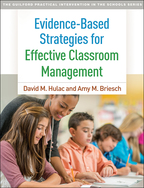Evidence-Based Strategies for Effective Classroom Management
David M. Hulac and Amy M. Briesch
A Paperback Originale-bookprint + e-book
A Paperback Original
orderAugust 22, 2017
ISBN 9781462531752
Price: $42.00 246 Pages
Size: 8" x 10½"
Classroom management is critical to successful teaching, but many K-12 teachers struggle with it. This indispensable guide distills the best classroom management science into easy-to-implement strategies teachers can use to promote a productive and safe learning environment. Chapters provide evidence-based guidelines for implementing classwide prevention strategies, token economies, group contingencies, and self-management interventions. Procedures for evaluating intervention effectiveness and individualizing interventions are described. Reproducible tools include 9 forms and 21 quick-reference “coach cards” that distill the key steps of each strategy. The large-size format facilitates photocopying; purchasers also get access to a Web page where they can download and print the reproducible materials.
This title is part of The Guilford Practical Intervention in the Schools Series, edited by Sandra M. Chafouleas.
“Do you want immediately usable strategies that have a high likelihood of maximizing the impact of academic instruction, preventing minor and serious problem behavior, and establishing an effective classroom climate? Then I encourage you to read this book. Hulac and Briesch's teacher-friendly approach to classroom management is theoretically sound, evidence based, and, most important, easily adaptable for both new and veteran teachers.”
—George Sugai, PhD, Professor and Carole J. Neag Endowed Chair, Neag School of Education, University of Connecticut
“Hulac and Briesch have given us an innovative guide that explains the nuances of behavior analysis with apt analogies, summary tables, and step-by-step suggestions for change. It becomes a simple task for teachers and other school practitioners to apply these potent strategies for change in their own classrooms. A useful work for beginning teachers and teacher candidates, this book also provides reinforcement for experienced practitioners, who will appreciate its coverage of the intricacies of classroom management and the possible interactions among different influences on student behavior.”
—Beth Doll, PhD, Associate Dean for Academic Affairs, College of Education and Human Sciences, University of Nebraska–Lincoln
“Classroom management skills are what make or break an educator, making this book a teacher's best friend. The book provides a wealth of tried-and-true strategies to ensure that classroom-based professionals will be effective and successful. A practical, highly accessible, and thoroughly enjoyable read, this is an essential text for undergraduate- and graduate-level classroom management classes, as well as a great supplemental text for behavior management classes.”
—Michael L. Sulkowski, PhD, School Psychology Program, University of Arizona
“It is challenging to articulate just how engaging and accessible this book is! From the very beginning, I realized I was in for some potent learning, but gaining this knowledge in such a fun and interesting format was an unanticipated treat. The authors efficiently explain relevant terminology and concepts while weaving in authentic scenarios that capture what teachers experience daily. This book is like one-stop shopping for teachers and school psychologists looking to improve behavior in the classroom. It is an outstanding resource for professional learning communities, and I expect to use it extensively in my work.”
—Andrea Clyne, PhD, LP, school psychologist, Boulder Valley School District, Colorado
“My school psychology graduate students have found this book to be informative for consultation with teachers. It is helpful in simplifying and applying behavioral principles to common classroom examples, so we can communicate in the same language when it comes to understanding student behaviors. My graduate students report success in supporting teachers to create classroom structures that prevent problem behaviors. When problems do occur, teachers are empowered to provide feedback in ways consistent with behavioral science. I recommend this textbook to any educator engaged in the task of supporting teachers to promote inclusive classrooms for all kinds of learners.”
—Tracy Paskiewicz, PhD, Department of Counseling and School Psychology, University of Massachusetts Boston
Table of Contents
I. Overview and Foundations of Classroom Management1. Why Classroom Management Matters
2. Understanding Behavioral Theories Relevant to Supporting a Well-Managed Classroom
II. Promotion and Prevention Strategies
3. Structuring the Classroom for Success: Preventing Problems before They Happen
4. Providing Students with Behavioral Feedback
III. Strategies for Addressing Classwide Behavioral Concerns
5. Implementing Token Economies
6. Group Contingencies
7. Self-Management
IV. Strategies for Enhancing Implementation and Effectiveness
8. Collecting Classwide Data
9. Assessing Intervention Integrity
10. Individualizing Intervention
References
Index
About the Authors
David M. Hulac, PhD, NCSP, is Assistant Professor of School Psychology at the University of Northern Colorado. He is President of the independent organization Trainers of School Psychologists and served as Program Chair for Division 16 (School Psychology) at the 2016 American Psychological Association conference. He is a recipient of the Belbas-Larson Award for Excellence in Teaching from the University of South Dakota. Dr. Hulac has multiple publications in the area of response to intervention for behavior and academics and is coauthor of Behavioral Interventions in Schools: A Response to Intervention Guidebook.Amy M. Briesch, PhD, is Associate Professor in the Department of Applied Psychology at Northeastern University. Her primary research interests include the role of student involvement in intervention design and implementation, and the development of feasible and psychometrically sound measures for the assessment of student behavior in multi-tiered systems of support. Dr. Briesch is Associate Editor of the Journal of School Psychology and a recipient of the Lightner Witmer Award for early-career scholarship in school psychology from Division 16 of the American Psychological Association. She has authored over 50 peer-reviewed journal articles, books, and book chapters.
